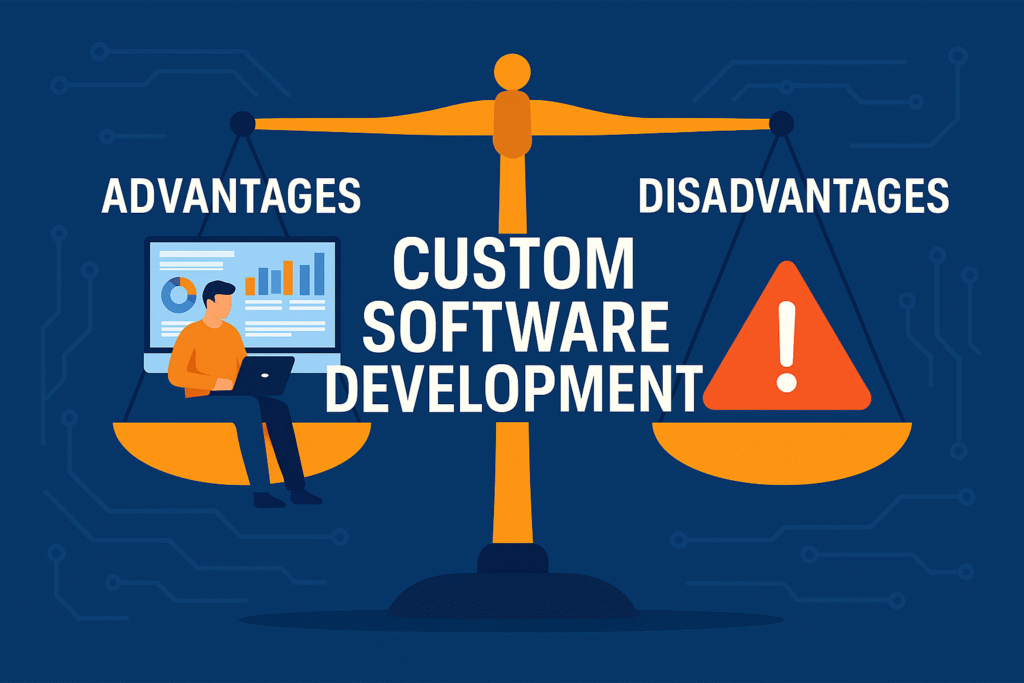Custom software development has become a cornerstone of digital transformation. Businesses are increasingly turning to tailored solutions to achieve greater efficiency, flexibility, and competitiveness. However, just like any investment, custom software has its strengths and drawbacks. In this blog, we’ll explore both sides, offering insights into when it is the right choice.
What Is Custom Software Development?
Custom software development refers to designing and building applications tailored to a company’s unique requirements. Unlike pre-packaged solutions, custom platforms are built from the ground up to support specific workflows, processes, and business goals.
Tailored to Organizational Needs
Unlike generic software, custom platforms focus exclusively on a business’s requirements. This ensures employees and customers interact with features that directly add value without unnecessary complexity.
Seamless Integration
Custom solutions connect with legacy systems, ERPs, or CRMs, ensuring smooth data flows. This eliminates silos and improves communication between business functions.
Future-Ready Solutions
Custom software is scalable, adapting to changes in markets, processes, or customer demands. Enterprises can expand functionality as needed, avoiding costly system overhauls.
Ownership and Control
With full ownership of the platform, businesses are free from licensing restrictions and vendor dependency. This offers greater flexibility and long-term strategic freedom.
Advantages of Custom Software Development
The primary appeal of custom platforms lies in the unique benefits they deliver, from efficiency to competitive advantage.
Competitive Differentiation
Custom-built solutions allow enterprises to create features competitors cannot easily replicate. This innovation becomes a powerful differentiator in crowded markets.
Enhanced Security
Tailored platforms can include advanced, industry-specific security protocols. Unlike mass-market tools, they are less vulnerable to widespread cyber threats.
Efficiency Gains
By automating repetitive tasks and streamlining workflows, custom software enhances productivity, enabling teams to focus on high-value activities.
Improved Customer Experience
Customer-facing applications are tailored for seamless interactions. Personalization fosters loyalty and improves brand reputation through user-friendly digital experiences.
Long-Term ROI
While expensive initially, custom platforms save money over time by reducing dependency on multiple tools, minimizing inefficiencies, and improving performance.
Disadvantages of Custom Software Development
Despite the benefits, custom solutions come with challenges that organizations must consider carefully before investing.
Higher Upfront Costs
Custom platforms involve significant development expenses compared to off-the-shelf tools. This investment can be prohibitive for small and medium enterprises.
Extended Development Timelines
Unlike ready-made software, custom systems take months or years to design, test, and deploy, delaying time-to-value.
Skilled Developer Requirement
Creating and maintaining tailored platforms demands highly skilled professionals. Enterprises must invest in hiring or partnering with experienced vendors.
Continuous Maintenance
Custom software requires ongoing updates, security patches, and optimizations, adding to long-term costs.
Vendor Dependency Risk
When developed externally, companies may become dependent on the vendor for updates and scaling. This makes selecting a reliable partner critical.
Why Businesses Choose Custom Development Despite Challenges
For many enterprises, the long-term value of custom platforms outweighs the disadvantages. Custom solutions deliver alignment with business strategy, scalability, and security that generic tools rarely achieve.
This is where custom software development services play a vital role. Expert teams bridge the gap between technical execution and business goals, ensuring solutions are not only effective but sustainable.
Comparing Custom vs. Off-the-Shelf Solutions
Businesses often weigh both approaches before making a decision. Each has distinct advantages depending on organizational priorities.
Cost Perspective
Off-the-shelf tools are cheaper initially, but recurring licenses and inefficiencies often make them more expensive long term.
Flexibility
Custom software adapts to business workflows, while pre-packaged tools force companies to adjust processes around standard features.
Deployment Speed
Ready-made solutions are fast to implement, while custom platforms require more time but deliver tailored functionality.
Scalability
Custom systems expand alongside business growth, whereas generic tools may require costly upgrades or replacements.
Control and Ownership
Custom platforms give businesses full ownership, unlike off-the-shelf software, which often ties organizations to vendor restrictions.
When to Invest in Custom Software
Not all businesses require custom solutions. The decision depends on scale, complexity, and long-term strategy.
Complex Workflows
Industries with intricate processes—such as logistics or manufacturing—benefit significantly from tailored platforms.
Compliance Demands
Healthcare, finance, and mining require software that meets strict regulations. Custom solutions embed compliance into workflows.
Growth Strategy
Companies aiming for rapid or global expansion need scalable systems that adapt to evolving demands.
Integration Needs
Organizations with existing ERP, CRM, or legacy systems require custom-built integration for seamless operations.
Security Sensitivity
Businesses dealing with sensitive data, such as healthcare or finance, must adopt secure custom platforms to mitigate risks.
The Role of Experts in Ensuring Success
Expert guidance is essential to maximize the potential of custom software. Consultants and developers ensure that solutions align with enterprise needs, meet compliance standards, and deliver measurable ROI.
Strategic Planning
Experts provide a roadmap that connects business strategy with technology, ensuring solutions meet long-term goals.
Technical Selection
They choose the right tech stack, ensuring platforms are scalable, secure, and future-ready.
Agile Project Delivery
Structured methodologies reduce risks, improve collaboration, and accelerate development timelines.
Testing and Quality Assurance
Comprehensive testing ensures the system is reliable, secure, and compliant before launch.
Post-Deployment Support
Ongoing updates, maintenance, and optimization keep systems relevant and effective over time.
Conclusion
Custom software development is a powerful driver of efficiency, scalability, and innovation. While higher upfront costs and longer timelines present challenges, the long-term benefits make it a valuable investment for enterprises. By weighing the pros and cons carefully and working with experienced experts, businesses can determine whether custom solutions align with their strategic goals.
FAQs
Q1. What is custom software development?
It is the process of designing tailored applications that meet specific business needs, ensuring greater flexibility and long-term alignment with goals.
Q2. What are the main advantages of custom software?
It delivers competitive advantage, enhanced security, greater efficiency, and long-term ROI.
Q3. What are the disadvantages of custom software?
High upfront costs, longer timelines, maintenance requirements, and dependency on skilled developers.
Q4. When should businesses consider custom solutions?
When workflows are complex, compliance-heavy, growth-oriented, or require deep integration and high security.
Q5. How do experts support successful development?
They provide strategy, technical expertise, project delivery, testing, and long-term support to maximize ROI.




Pingback: Coalescer: The Smart Solution for Cleaner, Efficient Filtration